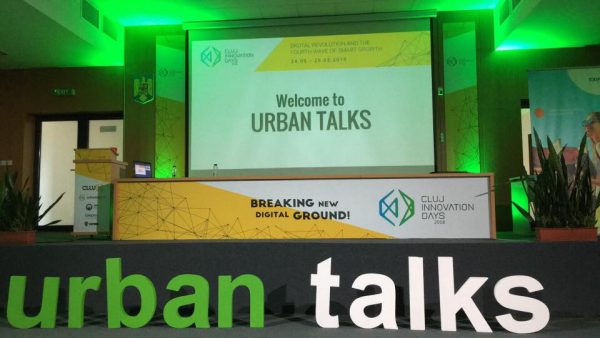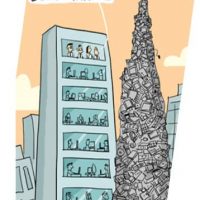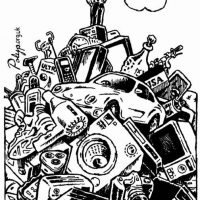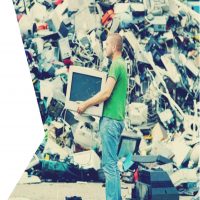We all dream of living in Smart Cities – communities where technology improves our life with innovative and effective solutions. What if technology entails hundreds of new, short-lived electrical devices, would that mean that a “smart city” would be overwhelmed by e-waste? No, of course. On the contrary, smart communities primarily rely on sustainability, and recycling is an essential part of sustainability.
“Green Citizens for Smart Cities” was RoRec Association’s perspective at Urban Talks – an event that brought together experts, ideas, solutions and projects on integrated, smart and sustainable urban development at Cluj Innovation Days, Romania, May 2018.
In the context of discussions about the role of technology, Andreea Idriceanu Calev, communication manager at RoRec Association, spoke about the magnitude of a problem faced by humankind: the huge amount of e-waste that suffocates the planet as we become more and more dependent on gadgets and various devices. “By 2030, 2/3 of the world’s population will live in the urban area – i.e. about 5 billion people. Also, in just a few years, there will be more mobile phone owners than people with access to electricity. This means billions of electrical and electronic appliances thrown each year. Already in 2018, people will generate over 5 million tonnes of e-waste,” said Andreea Idriceanu.
Smart cities are characterized by the balance between people and environment, with the help of technology and innovation. At the core of the system, both the “resource” and the “main source” remain … people.
 “There is no “Smart City” without “Green Citizens”. Cities of the future aim to work better on all levels, ensuring their economic prosperity while reducing the negative impact on the environment. For this, each of their constituents – citizens, authorities, businesses and civil society – has to act responsibly every day. No matter how innovative a city technology is, it can never compensate for the cumulative harmful effects of millions of gestures.”
“There is no “Smart City” without “Green Citizens”. Cities of the future aim to work better on all levels, ensuring their economic prosperity while reducing the negative impact on the environment. For this, each of their constituents – citizens, authorities, businesses and civil society – has to act responsibly every day. No matter how innovative a city technology is, it can never compensate for the cumulative harmful effects of millions of gestures.”
 In an exclusive interview for the Recycling Patrol, Grațian Mihăilescu, the founder of UrbanizeHub and one of the most well-known urban innovation specialists in Romania, points out that “Cities are in the hands of citizens, but they still do not realize it. With the evolution of technology, this influence of the citizen in the decision-making process will increase. These are the needs of communities – these solutions must be implemented to make life easier for citizens and not for the sake of selling new products or technologies to the administration. That’s why it is important, when this transition is made, for citizens to be prepared to get involved. ”
In an exclusive interview for the Recycling Patrol, Grațian Mihăilescu, the founder of UrbanizeHub and one of the most well-known urban innovation specialists in Romania, points out that “Cities are in the hands of citizens, but they still do not realize it. With the evolution of technology, this influence of the citizen in the decision-making process will increase. These are the needs of communities – these solutions must be implemented to make life easier for citizens and not for the sake of selling new products or technologies to the administration. That’s why it is important, when this transition is made, for citizens to be prepared to get involved. ”
 Graţian Mihăilescu supported the Recycling Patrol mission with his own message: “In order for our cities to be modern and clean, we need to be more involved first. Let’s take care of the city we live in as if it were our living room. It is the place where we are going to work, in which we grow up, in which we fall in love, where we raise our kids and we should treat it with respect and responsibility and do our best to contribute to its development. We have a bad mentality always blaming the authorities. But ask yourself: When was the last time that I did something for the city I live in? ”
Graţian Mihăilescu supported the Recycling Patrol mission with his own message: “In order for our cities to be modern and clean, we need to be more involved first. Let’s take care of the city we live in as if it were our living room. It is the place where we are going to work, in which we grow up, in which we fall in love, where we raise our kids and we should treat it with respect and responsibility and do our best to contribute to its development. We have a bad mentality always blaming the authorities. But ask yourself: When was the last time that I did something for the city I live in? ”
At Urban Talks, the Recycling Patrol, the environmental education program that RoRec has been developing for 8 years in Romania, has won the enthusiasm and appreciation of an audience of innovators, leaders, decision makers and companies who share the values of a better world, creators of projects that shape the future of Romanian cities.
At the end of its 7th edition, the program redefined environmental education in Romania, surpassing any expectations and breaking record after record. In 2018, the Recycling Patrol reached more than 110,000 volunteers, 3,000,000 kg of e-waste collected due to their efforts and over 5,000,000 people informed about the importance of collecting e-waste.
Through this program, RoRec Association has generated a movement of awareness and permanent mobilization in hundreds of urban and rural communities across the country, with a major impact on the increase of e-waste collection and recycling rates.




